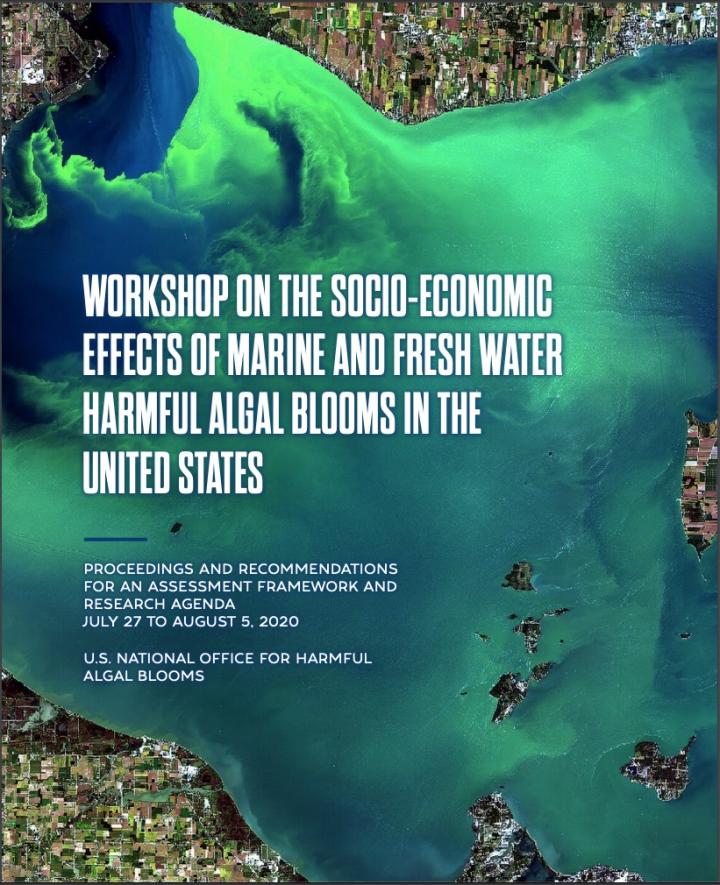
Credit: U.S. National Office for Harmful Algal Blooms
Harmful algal blooms (HABs) occur in all 50 U.S. states and many produce toxins that cause illness or death in humans and commercially important species. However, attempts to place a more exact dollar value on the full range of these impacts often vary widely in their methods and level of detail, which hinders understanding of the scale of their socio-economic effects.
In order to improve and harmonize estimates of HABs impacts nationwide, the National Oceanic and Atmospheric Administration (NOAA) National Center for Coastal Ocean Science (NCCOS) and the U.S. National Office for Harmful Algal Blooms at the Woods Hole Oceanographic Institution (WHOI) convened a workshop led by WHOI Oceanographer Emeritus Porter Hoagland and NCCOS Monitoring and Event Response (MERHAB) Program Manager Marc Suddleson. Participants focused on approaches to better assess the socio-economic effects of harmful algal blooms in the marine and freshwater (primarily Great Lakes) ecosystems of the United States. The workshop proceedings report describes the group’s objectives, and presents recommendations developed by 40 participants, mostly economists and social scientists from a range of universities, agencies, and U.S. regions. Their recommendations fall under two broad categories: those intended to help establish a socio-economic assessment framework, and those to help create a national agenda for HABs research.
“This has been a goal of the research and response communities for a long time, but coming up with a robust national estimate has been difficult, for a number of reasons, mainly related to the diversity of algal species and the wide variety of ways they can affect how humans use the oceans and freshwater bodies,” said Hoagland. “This gives us a strong base on which to build the insight that will vastly improve our estimates.”
Framework recommendations call for enhancing interagency coordination; improving research communications and coordination among research networks; integrating socioeconomic assessments into HAB forecasts and observing networks; using open-access databases to establish baselines and identify baseline departures; facilitating rapid response socio-economic studies; improving public health outcome reporting and visibility of HAB-related illnesses; fostering the use of local and traditional ecological knowledge to improve HAB responses; engaging affected communities in citizen science; and engaging graduate students in HAB socio-economic research.
Research agenda recommendations include elements necessary for addressing gaps in our understanding of the social and economic effects of HABs. They include a suggested approach for obtaining an improved national estimate of the economic effects of HABs; supporting rapid ethnographic assessments and in depth assessments of social impacts from HABs; defining socioeconomic impact thresholds for triggering more detailed studies of impacts (such as in the case of designated HAB events of significance); sponsoring research on the value of scientific research leading to improved understanding of bloom ecology; assessing the value of HAB mitigation efforts, such as forecasts, and control approaches and their respective implementation costs; and supporting research to improve HAB risk communication and tracking and to better understand the incidence, severity, and costs of HAB-related human illnesses.
“These recommendations give us a strong series of next steps to increase focus on HAB-related socio-economic research,” said Don Anderson, director of the U.S. National Office for Harmful Algal Blooms. “The report is certain to spur increased collaborations that will provide a better understanding of the many complex socio-economic effects of HABs and provide the tools to increase the effectiveness of efforts to minimize impacts on society and the environment.”
The detailed final proceedings report and more information about the workshop is available on the U.S. National HAB Office website.
###
About Woods Hole Oceanographic Institution
The Woods Hole Oceanographic Institution (WHOI) is a private, non-profit organization on Cape Cod, Massachusetts, dedicated to marine research, engineering, and higher education. Established in 1930, its primary mission is to understand the ocean and its interaction with the Earth as a whole, and to communicate an understanding of the ocean’s role in the changing global environment. WHOI’s pioneering discoveries stem from an ideal combination of science and engineering–one that has made it one of the most trusted and technically advanced leaders in basic and applied ocean research and exploration anywhere. WHOI is known for its multidisciplinary approach, superior ship operations, and unparalleled deep-sea robotics capabilities. We play a leading role in ocean observation and operate the most extensive suite of data-gathering platforms in the world. Top scientists, engineers, and students collaborate on more than 800 concurrent projects worldwide–both above and below the waves–pushing the boundaries of knowledge and possibility. For more information, please visit http://www.
Media Contact
WHOI Media Relations
[email protected]
Original Source
https:/




